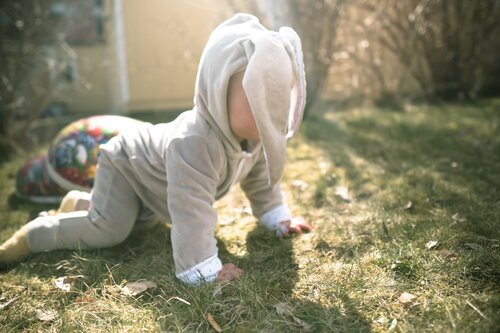This is the fifth part in our series, a guide for new parents and how to take care of your baby. This section focuses on babies at 2-4 months old, their physical and mental development, sleep, bedtime routines, as well as information on keeping active, immunisations and managing your mental wellbeing.
After the first 8 weeks of your baby’s life, you will start to see significant changes in your baby’s developmental skills and interactions. Here’s what to expect over the next 2 to 4 months of your baby’s life.
Your baby’s increased visual acuity
At the 2 month mark, your baby’s visual acuity has now developed, meaning your baby will be more engaged and interactive with the world around them. As their attention span begins to increase, they will enjoy reaching out and touching things, grappling at small, soft objects and kicking out on the activity mat. Mirrors are a great source of entertainment, as well as time spent in a recliner chair while they observe your activities around the kitchen. They will begin to vocalise, chuckle and engage with the world around them.
Increased mobility
In this time, your baby will begin to roll from back to front, and over time, roll both ways too. Be mindful of this, making sure to never place your baby on a bed or changing table without right beside them. Offer plenty of tummy time too, to help develop neck and shoulder muscles in preparation for even more mobility.

Your baby’s bedtime routine
At 2-4 months, your baby’s bedtime routines will be well established and your baby will have the ability to settle themselves at bedtime without too much intervention or support. They may still experience fractious times towards late afternoon or early evening, so recognising your baby’s ‘tipping point’ time to begin their bedtime routine before they become overtired is always a good strategy.
How much sleep does my 2-4 month old baby need?
Naps from around 3 months will reduce to around 3 per day and will typically last between 45 minutes to 2 hours. Awake periods will stay at 60 to 90 minutes, increasing to around an hour and a half to 2 hours as they approach the 4 month mark.
From 3 months on, your baby’s sleep requirements every 24 hours will decrease slightly to around 15 to 17 hours a day. At this stage, the time between feeds should be increasing and some babies may begin to sleep through the night, from around 10-11pm to 5-6am.
How to get your baby 2-4 month old sleep through the night
There are two things to bear in mind when working to help your baby sleep through the night:
- All babies are different, and there are no absolute guarantees that your baby will sleep though until fully weaned (around 6 months);
- To reduce the frequency of night feeds, ensure that daytime feeds are regular
As a guide, your baby will require approximately 5 to 7 feeds in a 24-hour period until they are about 3 months. After that, it may then go down to between 5 and 6.
Tip: Your baby will be much more aware of your presence and movement overnight, so consider repositioning the cot so that the baby is not in your direct line of vision (unless you are using a co-sleeping cot). Recognise that during a change of sleep phases, their sleep will lighten and consequently will often wake in the night before re-settling themselves.
If you are using a swaddle, consider stopping this at around 3 months, as your baby will be becoming more mobile. Moreover, the startle (Moro) reflex will have reduced by 8 weeks, so a swaddle will no longer be necessary.
Baby sleep accessories for your 2-4 month old baby
From about 8 weeks, a baby will be outgrowing a Moses basket and bassinet for outings, so a transition to larger crib or full size cot is imminent. They will also be big enough to transition to a reclining stroller, meaning that your baby will be able to engage with all the exciting new events while out and about.
If a pacifier is being used and you are keen to stop, around 4 months is a good time to do so. At 4 months, babies will begin to use their thumb to self-soothe.
Your baby’s daytime routines
From around 8-12 weeks, your days will have hopefully found some rhythm. If this is still a challenge, it can help to set the plan for your day based on your baby’s morning wake time. From here, you can plan the first nap and make plans for an outing either during the morning or afternoon, depending on what works best with naps and the times your baby enjoys the most. Whenever possible, try to have at least 2 out of the 3 day naps at home in the cot.
Going to group activities and social events with your baby
Trying to get your baby’s naps to work around any groups or social events you wish to attend can take some organisation, so prepare to be agile. When making plans, keep things simple and don’t try to ‘over achieve’ the number of outings and activities until you build up confidence and are able to assess your baby’s responses to different social situations. Babies (and parents) vary in sociability, so go at your own pace.

Immunising your baby
Immunisations are scheduled for babies at 8,12 and 16 weeks. Your health visitor will have given you the comprehensive NHS booklet, advising of the combination of vaccinations for each of these sessions, and the practice nurse will further advise of any potential side effects, and how to manage them, during the appointment.
Developmental leaps in your 2-4 month old baby
If you are reading The Wonder Weeks, you will be familiar with the periods at which your baby experiences key ‘mental leaps’ and may exhibit episodes of inconsolable crying, sleep regression, and generally unsettled behaviors. Essentially, they are experiencing a huge cognitive leap and are learning new skills, which can be overwhelming for your baby and so they manifest with behavioral changes. To the parents who may be discouraged by their baby’s alleged regression, we urge you to take courage - you haven’t done anything wrong! Understanding the stages of your baby’s development, how they manifest and how best to support and ‘contain’ your baby during these phases can be really helpful for all concerned.
Mental health, wellbeing and postnatal depression
As a new parent, your recovery, adjustment and emotions have seen enormous fluctuations since your baby was born. You may have felt some anxiety as you develop your own style, perhaps somewhat anxious about perceived expectations of others at this time. It is, however, a time when you develop and adopt your own unique way of parenting.
It is a work in progress, and we can’t get it right all the time! Go easy on yourself, and try to ‘ring fence’ some time for yourself during each week.
The majority of new mums will experience some periods of a low mood from time to time. When your baby is 8 weeks old, your Health Visitor will ask you to complete a questionnaire, and it is important that you read the questions carefully and answer them honestly. The presence of a persistent low mood can be an indication of postnatal depression. Upon receiving this diagnosis, you will be able to access support from various networks and receive professional guidance to help you recover.
Looking for a night nanny, maternity nurse, lactation specialist or baby sleep consultant to help you through the first 2-4 months after birth? Get in touch with us at hello@mytamarin.com or sign up today to find the best postnatal support for you.
This blog is the fifth in our ‘A New Parents' Guide to Baby Sleep and Routine’ series.
Previous chapters;
A New Parents' Guide to Baby Sleep and Routine: How to care for a newborn baby
A New Parents' Guide to Baby Sleep and Routine: The first two weeks with a newborn baby
A New Parents' Guide to Baby Sleep and Routine: A guide to your baby's body
A New Parents' Guide To Baby Sleep and Routine: Caring for your newborn baby at 2-8 weeks
Following chapters;
A New Parents' Guide To Baby Sleep and Routine: Caring for your baby at 4-6 months
A New Parents' Guide to Baby Sleep and Routine: Caring for your baby at 6-12 months
A New Parents' Guide To Baby Sleep and Routine: Wind, colic and reflux in babies
Similar articles
Ways to develop your child's social skills in lockdown
Top tips from experts on how parents and nannies can develop social skills in children
Read postAll-in-one: CV-19 and nanny employment
How to navigate SSP, short-time working, redundancy and furloughing for nannies
Read postA New Parents' Guide To Baby Sleep and Routine: Wind, colic and reflux in babies
A new parents' guide to spotting and managing wind, colic and reflux in babies
Read postFun and safe Halloween activities for children, nannies and parents
Fun and coronavirus-friendly activities for nannies, parents and children
Read post Back to all resources
Back to all resources